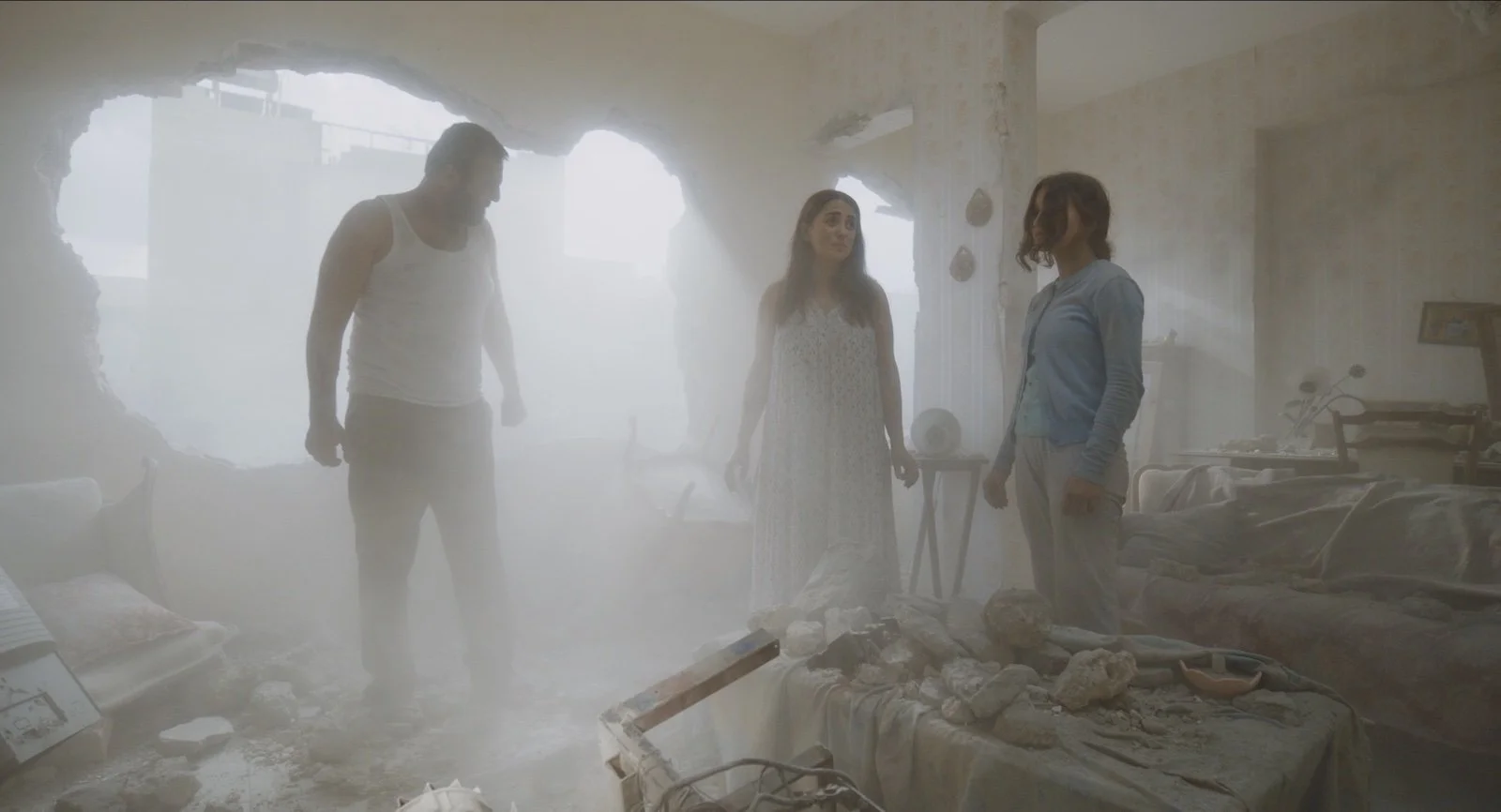Soudade Kaadan's film is a fable of two women and the men who love them (well, one man and one boy really) and the power and magic that love carries with it. From the MIME.news archives.
When their home in Damascus is bombed and the family gets all their windows blown out, most of their ceiling collapses and their entire possessions are covered in dust and debris, the father Motaz, played by the extraordinary Samir al-Masri exclaims "God really loves us, he spared our home!" And that, in one line, explains the spirit of Soudade Kaadan's second directorial narrative feature Nezouh.
The word "nezouh" as we read on the black screen right at the start of the film, means "the displacement of water, people or things" and Motaz, the head of the household, is adamant about keeping his family from experiencing it. As the man in charge of his wife Hala and their teenage daughter Zeina, he is trying his best to keep it together, as the world literally crumbles around him.
Kaadan's beautifully poetic film is anything but another ode to poverty porn or a celebration of blow ups and destruction in Syria. After all, we can watch that on the news, so why would we need it in cinema... What Nezouh is instead is a fable of two women and the men who love them (well, one man and one boy really) and the power and magic that love carries with it.
While Kaadan's first film The Day I Lost My Shadow, which also world premiered in Venice in 2018, may have left me a bit baffled at times, Nezouh completely captured my attention and imagination from beginning to end. Kaadan has proven a voice to reckon with in world cinema and I look forward to what she will make next, since both her style and delivery changed so drastically from one project to the next.
In Nezouh, she also enlisted the help of four spellbinding actors, which include al-Masri but also Kinda Alloush, as Hala the mother, Hala Zein as the daughter Zeina and Nizar Alani as the young neighbor Amer -- who captures Zeina's imagination and our hearts.
As their neighbors disappear, and the neighborhood is left in a pile of rubble, Motaz fights to keep himself, and his family from becoming displaced -- and yet another statistic in the refugee crisis. But Zeina discovers freedom, and her first love from this newly "decorated" home, where flowery sheets become window blinds, awnings and a curtain that opens onto the stage of the imagination. Behind this curtain, both Hala and Zeina see an ocean, but also the open sky, and the possibilities there are endless.
Enter Amer, the boy next door quite literally -- well if doors still existed in this bombed out landscape -- a vision of cuteness and kindness but also a young man who has amassed a collection of tech gadgets from a news crew that left the city in a hurry. Alani plays him understatedly handsome and the scenes between him and the pretty Zein are some of the cutest, most truthful love scenes I've viewed in recent cinema. It also helps that for Kaadan Italian neorealism, and in particular the cinema of Vittorio de Sica, are a constant inspiration. A world where the child becomes the parent and vice versa, as in Bicycle Thief, which for the Syrian filmmaker was a starting point for this project.
Al-Masri's desperation and his energy wasted in keeping the leaky boat that is the family's life and home in Damascus afloat is palpable throughout the film, which makes him a very likable male character for Arab cinema. His emotional vulnerability is so opposed to his broad, masculine physical appearance that it also makes for some light moments, which even inspired a few giggles at the screening I attended. What lacks in the film is the pathos I find so unattractive in any telling of a story from the Region.
It is also fascinating to finally be faced with the human reasons behind the mass exodus we have seen coming from Syria since 2011. In Europe, we watch the refugee crisis from the frontlines but we never actually manage an inside look into the motivation of that movement. No one leaves their own country by choice and in Nezouh, we are given the backstory and insight to finally understand where, emotionally and geographically, the displacement first happens.
Ultimately Kaadan's film is a must watch and part of the reason why -- an important aspect in all cinema in my humble opinion -- is the visual deliciousness of Nezouh, courtesy of her DoPs Helene Louvart and Burrak Kanbir but also her art director Osman Ozcan. The film was shot in Turkey, as Syria is obviously out of questions for Kaadan and most Syrians, and the team, directed by Ozcan, had to recreate a Syrian home from scratch.
While the film doesn't spell out a political statement nor does it make crystal clear Kaadan's political position (and it does not really need to!) Nezouh is an obvious declaration on the power of cinema and its ability to change the world -- by changing our awareness and finessing our viewpoint.
And for that alone, Nezouh is an absolute winner.
The film premiered in the Horizons Extra section of the 79th edition of the Venice Film Festival, winning the Armani Audience Award.
United Kingdom/Syria/France/Qatar, 2022, 103 mins
Dir/Writ: Soudade Kaadan
Prod: Yu-Fai Suen, Soudade Kaadan, Marc Bordure
Exec Prod: Yuan Zhang, Alaa Karkouti, Ben Coren, Daniel Batsek, Donna Gigliotti, Farhana Bhula, Lizzie Francke, Peter Luo
Ass. Prod: Amira Kaadan, Yuxin Liu
Cinematography: Helene Louvart, Burrak Kanbir
Editors: Soudade Kaadan, Nelly Quettier
Music: Rob Lane, Rob Manning
Cast: Hala Zein, Kinda Alloush, Samir al-Masri, Nizar Alani, Darina Al Joundi, Nabil Abousalih and Samer Seyyid Ali.
International Sales: mk2 Films
